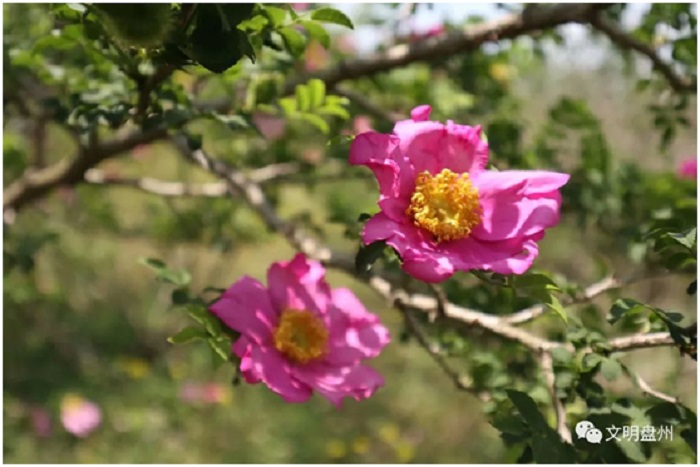



Roxburgh rose fruit business is now a shiny signboard of Jiaxi village in south west China’s Guizhou province, helping local residents shake off poverty and embrace a bright future.
By the end of 2019, residents in the village located in Panguan town, Panzhou city of Guizhou, had planted over 6,600 mu (about 4.4 square kilometers) of roxburgh roses. Their efforts also drove residents from neighboring villages to grow a total of 31,200 mu of the plants.
The roxhurgh rose industry had benefitted 3,498 households from Jiaxi and seven other villages, created nearly 400 jobs, and helped lift 257 households out of poverty.
In 2019, the per capita income of villagers in Jiaxi rose to 12,044 yuan ($1,860), and all poor households in the village had bid farewell to poverty.
Back in 2014, Jiaxi was still a severely impoverished village in the Wumeng Mountain region. Its incidence of poverty stood at 29.36 percent.
At that time, the village was hold back by poor roads, and its residents, who grew corns and potatoes in the mountains, barely had decent income.
To change the situation, Nie Deyou, a resident of the village who used to work out-of-town, returned home and tried to persuade his fellow villagers to grow roxburgh roses, which he believed is a suitable business for the village to get rid of poverty.
However, nobody in the village bought into his idea. As a result, he sought help from officials with the township government, telling them the crop is resistant to drought and barren land, and helps conserve water and soil – the reason he believes the plant is suitable for the village.
It usually reaches full bearing in three years, and one mu of the plant brings an annual income of nearly 4,000 yuan, he further explained to the officials.
Thanks to his sincerity, the officials were finally persuaded, and sent cadres to Jiaxi village to explain the benefits of growing roxburgh roses.
The income per mu of corns stood at only 400 yuan before deducting labor input, while the minimum output per mu of roxburgh roses, if entrusted to cooperative, could reach the same amount, and plus, the villagers could also gain extra income working other jobs, the cadres told the villagers.
Li Xiaoyu, a fellow villager of Nie, opposed the roxburgh rose proposal at first, saying he saw no economic value in the fruit. However, after being persuaded by the cadres, he transferred 7 mu of land to an cooperative in the village, and the benefit of it further drove him to transfer all his 20 mu of land to the cooperative a year later. The man who used to work in east China’s Zhejiang province also returned home and found a job in an industrial park for roxburgh roses in the village
“The land transfer earns me 8,000 yuan each year, and I can also make 6,000 to 7,000 yuan from the job in the industrial park,” he said. Seeing a recent bumper harvest, the man called a relative who worked in Zhejiang to come back home and join the prosperous roxburgh rose business.
In 2016, Hongcai Group, a state-owned enterprise in Guizhou, bought shares in the village’s cooperative, and then established a complete industrial chain covering planting, processing and sales of roxburgh roses.
Later, Panzhou established a R&D center for roxburgh roses and a research institute for related industries.
The city has developed over 50 roxburgh rose product series, obtained 553 intellectual property rights and 67 product patents, and formulated 15 industrial standards involving the cultivation, planting, production and processing of roxburgh roses.
Last year, Jiaxi village reaped 3,200 tonnes of roxburgh roses, which generated a value of nearly 13 million yuan.
With Jiaxi village as a pioneer, Panzhou city has invested more than 6 billion yuan and formed an integrated industrial chain from the planting, R&D, processing to sales of roxburgh roses.
During China’s National Day holiday in 2020, the village’s industrial park, which covers orchards and a processing factory, received nearly 10,000 visits, and almost 3 million yuan of products were sold.
The plain plant is now a thriving industry in Jiaxi village. “The fruit has literally led us on a path to wealth,” said Long Tao, Party chief of Jiaxi village, expressing his confidence for the future.


The Executive and members of the.


The Acting Director, FCT Directorate of.


President Bola Ahmed Tinubu has been.



Barely a month after resignation of.


An Abuja based Legal Practitioner, Osuagwu.



Convener of Equitable Remedy, Mrs. Magaret.


Contractors handling the contract for city.


Nigerian government may have concluded plans.


The Diplomatic Correspondents Association of Nigeria.


A rights group, “Follow Me Talk.
Leave a Comment